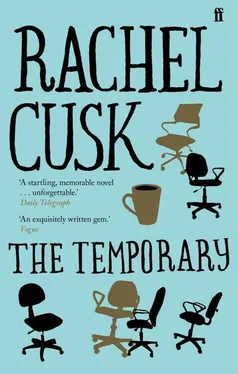Rachel Cusk - The Temporary
Здесь есть возможность читать онлайн «Rachel Cusk - The Temporary» весь текст электронной книги совершенно бесплатно (целиком полную версию без сокращений). В некоторых случаях можно слушать аудио, скачать через торрент в формате fb2 и присутствует краткое содержание. Год выпуска: 2013, Издательство: Faber & Faber, Жанр: Современная проза, на английском языке. Описание произведения, (предисловие) а так же отзывы посетителей доступны на портале библиотеки ЛибКат.
- Название:The Temporary
- Автор:
- Издательство:Faber & Faber
- Жанр:
- Год:2013
- ISBN:нет данных
- Рейтинг книги:5 / 5. Голосов: 1
-
Избранное:Добавить в избранное
- Отзывы:
-
Ваша оценка:
- 100
- 1
- 2
- 3
- 4
- 5
The Temporary: краткое содержание, описание и аннотация
Предлагаем к чтению аннотацию, описание, краткое содержание или предисловие (зависит от того, что написал сам автор книги «The Temporary»). Если вы не нашли необходимую информацию о книге — напишите в комментариях, мы постараемся отыскать её.
The Temporary — читать онлайн бесплатно полную книгу (весь текст) целиком
Ниже представлен текст книги, разбитый по страницам. Система сохранения места последней прочитанной страницы, позволяет с удобством читать онлайн бесплатно книгу «The Temporary», без необходимости каждый раз заново искать на чём Вы остановились. Поставьте закладку, и сможете в любой момент перейти на страницу, на которой закончили чтение.
Интервал:
Закладка:
‘What do you think?’ he said, beaming.
Francine was standing near by and she leaned over slightly so that she could see what it was. It was a full-page advertisement for underwear. A girl with dark hair lounged on a sofa clasped in small pieces of lace.
‘How about that?’ persisted Mr Louche. ‘Isn’t she something?’
‘She has a very kind face,’ agreed Mr Lancing, nodding. ‘She looks as though she’d be very nice.’
Mr Louche returned with the picture to his desk. Moments later Francine saw him sticking it to the wall behind him with a drawing pin. At one o’clock, Mr Lancing and Mr Louche put on their jackets and left the office for lunch.
‘Bye, girls,’ said Mr Louche from the doorway.
Francine left soon after them, trying to look as little as possible as if she were going on an expedition to the shops lest the others ask her to buy sandwiches for them. That had happened on her first day, when she had been eager to be pleasant and had asked if anyone wanted anything because she was going out. She had spent the entire lunch hour queuing in a sandwich shop with a list saying who wanted butter and mayonnaise and which of them liked salt and pepper. As she left the building and launched herself into the swarming pavement, she was met by the familiar volley of glances of which she had eventually tired in Kent; but the homage of London’s streets never failed to uplift her with the suggestion that here, at the centre of it all, she was still everything she had believed herself to be. At first she had sometimes felt fearful that the unexceptional landscape of her old town had been too flattering a foil, but now it seemed to her that people had never really looked at her there, that she had been out of scale and incomprehensible to them. For the first time, she was really being appreciated. The fact that this appreciation as yet took such an insubstantial form — a deep and searching look, sometimes an expression of brazen pleasure, occasionally even a comment — worried her only mildly, for she felt sure that time would see its maturation into something more useful. It was just a question of staying in the light long enough to be seen, of keeping herself above the surface; and although Francine had faith in her own buoyancy, lately she had seen glimpses of a subtle, unexplained terror, that if ever she disappeared from view, she would sink and sink with no one to save her.
Francine ate her sandwich at her desk. By the time she had finished, it was not yet half-past one, and she felt the day drag at her with its unsparing hours. A murmuring quietude had settled on the office after the excited swell of Mr Lancing’s departure. The other girls sat turning the pages of magazines. Lorraine was on the telephone at the desk next to Francine’s.
‘Really? Really? ’ she said.
Francine had nothing to read. She wished she had bought a magazine when she was out. She thought of calling Janice, but when she considered it more closely could think of nothing to say. She found her eyes running automatically along the typed lines of a letter in front of her, which she had printed out for Mr Lancing before lunch and which now awaited his signature. Her mind emptied with the exercise and when next she looked at her watch she saw that five minutes had passed. Boredom did not usually trouble her, for her contemplations were large and continuous, and often seemed more real and colourful than her physical activities. The facility with which she found her thoughts could slip away, hurrying back to the subject of herself after the interruptions of circumstance, meant that generally she relished these vacant interludes, filling them with the enactment of things passed or to come, and even occasionally with vivid scenes featuring people she had invented and was unlikely ever to meet. Sometimes her absorption would develop into a state of trance, the crowds of her consciousness dispersed to permit higher meditations which, although they could be achieved more easily in front of a mirror, were still accessible merely through the memory of one.
On this occasion, however, as she tried to think of the meeting with Ralph scheduled for the evening ahead, she found that her mind would not pleasure her. There was something in their connection which made the contemplation of it hostile to her enjoyment, and when she touched on it, even wrapped in the deepest clouds of illusion, her thoughts came back to her punished as if an electric shock had repelled them. Dimly she knew that her telephone call, made at the end of that long Friday evening during which she had battled and lost against resolution, had been a mistake. Despite the warm contrivances of her imagination the horrible truth it had fleetingly revealed sent its chill through every passage along which Francine tried to approach their arrangement. She was unused to analysing the motivations of her admirers and the memory of Ralph’s resistance, the ultimate defeat of which had permitted her to inter it in the deepest tomb of the forgotten, began to struggle again with life. He had behaved oddly that evening at his flat, but the subsequent improvement in his affections had led her then, as it did again now, to suppose it the product of nerves, a facet of his shyness or perhaps even his intelligence — a mystery in which she had little interest except in thoughts of the more interesting consequences of its enslavement. In the end everything had happened as it always did, but in this case the greater difficulty of achieving what was recognizable left Francine with a certain reluctance to abandon the scene of her hard work. After all, she could have just turned around and gone home right at the beginning, there on the doorstep! The fact that finally he had done what was expected of him was her only place of refuge, but even there the suspicion that something was wrong tracked her down.
His coolness on the telephone could, after all, have been nothing but a habitual return to restraint, a sort of tic out of which it might take some time to train him. She examined their conversation warily in the light of this new theory. He had been polite, but there had been something weary in his voice when she had announced herself, a tone disconcertingly similar to that deployed by her mother only a few hours earlier. Afterwards she had alternately comforted and upbraided herself with the memory of his reserve, one minute assured that his manner was merely the proof of his being a different ‘type’, the next horrifyingly tempted to believe that, even so, one or two of the same rules must apply, and that if he’d wanted to see her he would have asked. Truth laboured over this point, fatigued but resilient. Try as she might to camouflage the fact that she herself had suggested they meet, the material of fabrication was simply not there. Not thinking about that particular aspect of things at all had proved her only escape, but she felt its haunting presence.
She switched on her computer and stared at the awakening screen. Her thoughts had made this long journey several times over the past few days, and as often as not arrived at defiance. As she began to type another letter for Mr Lancing, she resorted to the secondary pleasure of thinking how cool she would be with Ralph, how obvious it would be that she didn’t care about him, and, in a triumph of regained authority, how she might not even turn up at all.
‘That’s a bit keen,’ said Lorraine, putting down the telephone.
‘I’ve got to leave early,’ said Francine.
‘Up to something special tonight, then?’
‘I’m meeting my boyfriend,’ said Francine, an enjoyable feeling of satisfaction warming her limbs as she said the words. ‘He’s taking me out.’
‘Really?’ said Lorraine.
*
It had been milder that day, and even though darkness had fallen Francine found that she could walk with her coat unbuttoned. If she walked briskly enough, it flew behind her in a manner she interpreted as romantic, and the intermittent revelation of her legs by its flapping drew the inquisitive glances of Camden High Street.
Читать дальшеИнтервал:
Закладка:
Похожие книги на «The Temporary»
Представляем Вашему вниманию похожие книги на «The Temporary» списком для выбора. Мы отобрали схожую по названию и смыслу литературу в надежде предоставить читателям больше вариантов отыскать новые, интересные, ещё непрочитанные произведения.
Обсуждение, отзывы о книге «The Temporary» и просто собственные мнения читателей. Оставьте ваши комментарии, напишите, что Вы думаете о произведении, его смысле или главных героях. Укажите что конкретно понравилось, а что нет, и почему Вы так считаете.












